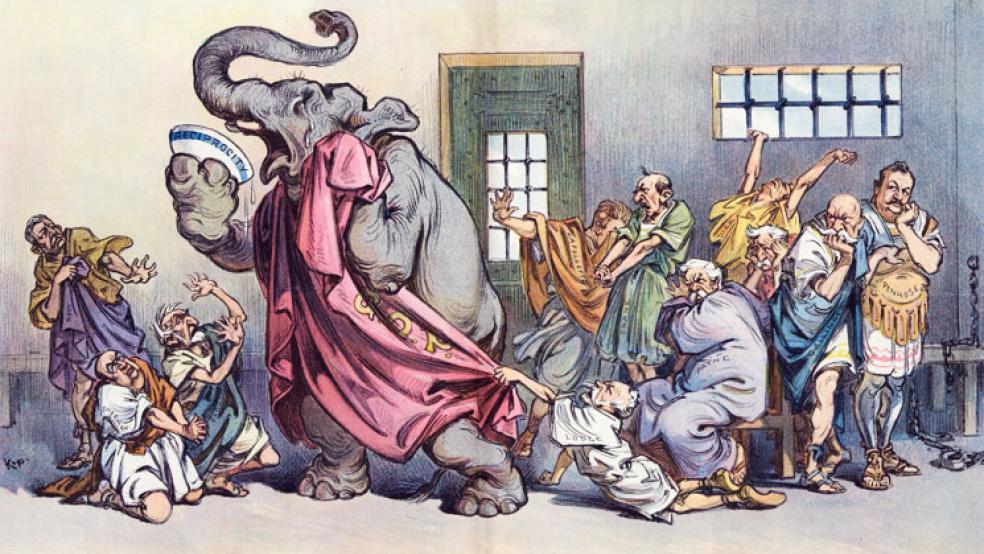Social Security is not just a gray hair issue. Millennials are not only a major force as voters, but the massive generation now comprises the majority of the American workforce. And one thing all workers take note of -- all of the deductions from our paychecks. We’re all paying into the Social Security system; the question is: What will we receive in return tomorrow for every dollar that’s taken out of our paycheck today? And when do we get our money back?
Republican presidential candidates are already stirring voters with talk of raising the national retirement age. Presidential candidate and Florida Governor Jeb Bush says Social Security benefits need to be delayed to age 68 or 70.
“So people that already have the supplemental retirement system, which is a contract, I don't think we violate that. For people that are about ready to be beneficiaries of their supplemental retirement, I don't think we change that,” Bush said Sunday on CBS’s “Face the Nation.” “But we need to look over the horizon and begin to phase in, over an extended period of time, going from [age] 65 to 68 or 70. And that by itself will help sustain the retirement system for anybody under the age of 40.”
Related: As Hillary’s Numbers Dip, Benghazi Rises As an Issue
Currently, the “normal retirement age” for full Social Security benefits is age 65 for those born in 1937 or before. For those born in 1938 and later, it rises in two-month increments -- to age 66 for those born from 1943 to 1954, and 67 for those born in 1960 or later. “Early retirement” for all Social Security recipients, with benefits reduced by as much as 30%, can begin at age 62.
Bush is not alone in suggesting a fundamental change to Social Security. In a large, and growing, field of Republican contenders, most are calling for boosting the retirement age. New Jersey Gov. Chris Christie proposes a normal retirement age of 69 -- with early retirement benefits delayed to age 64. Sen. Marco Rubio of Florida has floated similar increases.
Rand Paul is also in favor of raising the retirement age, but only for younger workers. And like most Republicans, he favors “means testing” – a reduction in Social Security benefits for the wealthy.
“During my time in the Senate, I have worked on proposals that would fix the shortfalls in the Social Security program through a gradual increase in theage of full retirement and by means testing yearly earnings, while preserving those benefits for near and current retirees,” Paul says in a statement on his website. “These changes would only apply to younger Americans who have time to plan for the future.”
But Republican presidential candidate Mike Huckabee is proposing a change to how Social Security is funded, rather than when benefits can be taken. On the campaign trail in Orlando yesterday, he made his opposition to raising the national retirement age clear.
Related: How to Fix the Broken Disability Insurance System
“The concept that we’re going to go in and tell people, after they’ve involuntarily paid money into a system – for which they had no choice – and the government told them, ‘If you let us take this money out your checks for all these many years – 50 years of your work – here are the benefits that will be waiting at the end of the rainbow,” Huckabee said. “And then, after they’ve worked 40 or 50 years, tell them, ‘Well, you know what, we just miscalculated the whole thing, and we not only stole from you, but now we’re going to lie to you. That is a recipe not only for political suicide, but that is a recipe for economic suicide.”
Meanwhile, in April Democratic presidential contender Hillary Clinton said that there had been a lot of “loose talk” about Social Security.
“The Social Security trust fund, according to the trustees, will be solvent until 2035,” Clinton said at a New Hampshire campaign stop. “So what do we do to make sure it is there, and we do not mess with it, and we do not pretend that it is a luxury because it is not a luxury. It is a necessity for the majority of people who draw from Social Security. So I think there will be some big political arguments about Social Security.”
Rather than suggesting Social Security cutbacks, Clinton faces pressure from liberal Democrats who wish to expand benefits. So far, she has refused to indicate a move in either direction.
This article originally appeared on Main Street.
Read more from Main Street:
Only 6 of the 50 Best Restaurants in the World are in the U.S.
These 15 Billion-Dollar Brands Are the Most Valuable in the U.S.
15 Totally Wacky Things You Can Buy at Wal-Mart



